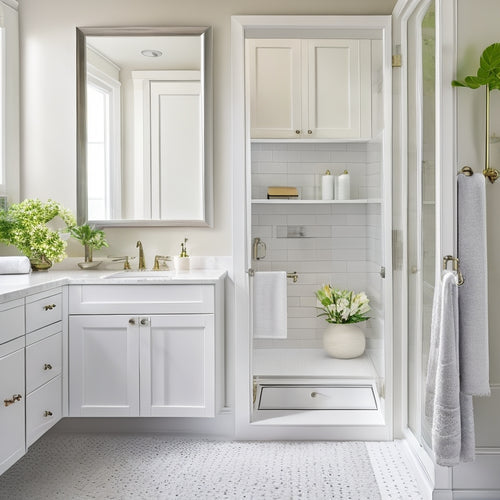
Expert Tips: Choosing Perfect Hardware Components
Share
When selecting ideal hardware components, it is crucial to evaluate compatibility needs, analyze system requirements, operating system and software compatibility, and future upgrade paths. Strike a balance between performance and budget by considering processing power, memory, and storage, while keeping an eye on budget constraints. Prioritize user and security needs by identifying requirements, mobility needs, and input/output requirements, as well as evaluating security features, reliability, and vendor reputation. By considering these factors, you'll be well-prepared to make informed decisions. To guarantee seamless integration and peak performance, there's more to explore in the nuances of hardware component selection.
Key Takeaways
• Evaluate system requirements and component selection to ensure smooth integration with existing systems and mitigate compatibility issues.
• Strike a balance between processing power, memory, and storage to meet performance requirements within budget constraints.
• Identify user requirements, including mobility and input/output needs, to select hardware that enhances user experience and efficiency.
• Optimize budget by considering long-term costs, warranties, and support to ensure sustainable hardware investment.
• Focus on user and security needs, evaluating security features, reliability reviews, and vendor reputation for secure and reliable hardware choices.
Evaluating Hardware Compatibility Needs
Ensuring smooth integration with existing systems is an important aspect of choosing perfect hardware components, as compatibility issues can lead to costly downtime and productivity losses. To mitigate this risk, it is essential to carefully evaluate system requirements and component selection.
This involves verifying that the chosen hardware meets the necessary system requirements, including operating system and software compatibility. Additionally, consideration should be given to future upgrade paths to guarantee that the selected components can be easily integrated with future system updates.
Assessing Performance and Budget
When selecting hardware components, it is essential to strike a balance between processing power, memory, and storage capacity to meet performance requirements, while also keeping a watchful eye on budget constraints to avoid overspending.
Evaluating performance and budget involves evaluating processing power needs, RAM and storage requirements, and benchmark performance to guarantee seamless operation.
Budget optimization is vital, as it involves determining budget constraints, comparing prices, and factoring in long-term costs, warranties, and support.
Prioritizing User and Security Needs
As the foundation of performance and budget considerations is laid, attention turns to the equally important aspects of user experience and security, which can make or break the effectiveness of chosen hardware components. To prioritize user and security needs, it's essential to assess the requirements of the intended users and the level of data protection necessary.
| User Experience | Security |
|---|---|
| Identify user requirements | Assess security features |
| Consider user mobility needs | Check for reliability reviews |
| Evaluate user input/output requirements | Look at warranty terms |
| Check for specialized hardware needs | Consider data protection features |
| Consider user preferences | Evaluate vendor reputation |
Frequently Asked Questions
Can Refurbished Hardware Components Be a Cost-Effective Alternative?
'Refurbished hardware components can be a diamond in the rough, offering cost savings without compromising performance, but it's important to scrutinize warranty concerns and quality assurance processes to guarantee reliability and mitigate potential risks.'
How Do I Dispose of Old Hardware Components Sustainably?
When disposing of old hardware components, prioritize eco-friendly disposal through responsible recycling programs, adhering to local regulations and guidelines to minimize electronic waste and environmental impact, ensuring a sustainable and environmentally conscious approach.
Are There Any Benefits to Buying Hardware Components in Bulk?
According to a study, 71% of businesses report cost savings when purchasing hardware in bulk. Buying in bulk leverages economies of scale, simplifying inventory management, and reducing costs, making it a strategic decision for organizations seeking efficient hardware procurement.
Can I Mix and Match Hardware Components From Different Manufacturers?
When mixing and matching hardware components from different manufacturers, compatibility issues arise, potentially leading to system instability and performance degradation; brand loyalty can mitigate these risks, but careful evaluation of interoperability is still essential.
Are There Any Specific Hardware Components That Require More Maintenance?
Like a delicate orchestra, hardware components harmonize to create a seamless performance. Among them, server cooling systems and high-power draw components, such as graphics cards, require meticulous maintenance to prevent overheating and guarantee peak functionality.
Related Posts
-

Momtrepreneurs: Master Organization for Success
As a busy momtrepreneur, I've learned that mastering organization is the key to unleashing my full potential. To achi...
-

Revamp Your Home With Spring Cleaning Checklist
Spring's arrival presents a prime opportunity to transform your living space, shedding the remnants of winter's hiber...
-

Revamp Your Bathroom Storage: Declutter and Organize
You're tired of the cluttered countertops, messy drawers, and chaotic cabinets stealing your bathroom's serenity. It'...


